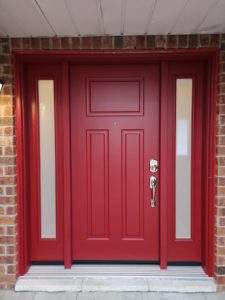Are you thinking about buying a window air conditioner for your home? Summer days can get pretty hot and humid here in Ontario. With heat advisories and temperatures hovering at 30 degree Celsius and higher during July and August, it’s very important to have the means to keep cool. Most people rely on air conditioning to stay cool. Therefore, it’s important for you to choose the right air conditioning unit for your home.
What Type Of Air Conditioner Should I Choose?
There are many different types of air conditioners you could choose. It all depends on what is the right model for your situation. For some, it’s a central AC system, ductless air conditioner, or portable unit. But, for many Ontario residents, especially those who rent or live in an apartment, window air conditioners are an ideal solution to keep cool.
Window air conditioners come in a variety of options and they are a more economical option. Choosing the right window AC unit can take some research. You want to make sure you choose the best option for your home. Here, we’ll provide you with the information you need to help you choose the right window air conditioner for your home.
What Size Window Air Conditioner Do I Need?
Size matters when choosing a window air conditioner. You don’t want something too big or too small or it won’t work as they are intended. You want to find an AC unit that is the ideal size for your needs. Mary H.J. Farrell on Consumers Reports explains:
“Size matters when you’re buying a window air conditioner. An AC that’s too small will struggle to keep a room at a comfortable temperature. A model that’s too big will cool a room too quickly without removing enough humidity from the air, leaving you cold and clammy.”
“Choose just right and you’ll feel just right—and save money, too,” she adds.
Homedepot.ca offers similar advice in relation to choosing a window AC unit for your room with the right BTU:
“Selecting the right BTU (British Thermal Unit) for your room size will ensure you have the most energy-efficient cooling system for your home. BTU ratings are numbers that tell you how quickly and effectively a unit can cool a room. Generally, ratings range from 5,000 to more than 20,000 BTUs. When an oversized air conditioner is used in a small space, it cycles on and off and wastes energy, decreasing the unit’s ability to dehumidify the room. Alternatively, if a unit has too few BTUs, it will not be able to cool a large space efficiently.”
So, what size window air conditioner do you need? Window air conditioners generally come in three sizes:
1. Small window air conditioners
These are ideal for a standard bedroom or office space. Smaller units are designed for spaces that range from 100 to 300 square feet. Units are between 5000 and 6500 BTU. These window are conditioners are the smaller, lightest, and most affordable option available. On average, they can cost $250 or less.
2. Medium size window air conditioners
These are ideal for a larger master bedrooms or a living room or den space. These units are designed for spaces that range from 250 to 400 square feet. Units are between 7000 and 8500 BTU. This units are more bulky, which can affect installation and the type of unit they can be installed in. Prices can easily reach the $400 range or more.
3. Large window air conditioners
These are ideal for a larger family rooms and open spaces. Larger units are designed for spaces that range from 300 to 650 square feet. Units are between 95000 and 12500 BTU. These larger units are the most challenging to install because of their size and weight. They are also the most expensive. They can range up to $600 or more.
Note that price can also vary based on the types of features included with the AC unit.
Other Room Size and Feature Considerations
In addition to the square footage of the room, there are also some additional room features to consider before choosing a window AC unit. You need to also consider the ceiling height, if the room is properly insulated, daily sun exposure through the window, and the climate in your area. There may also be other considerations that are specific to your home and room.
These can all play a role when selecting an AC unit with the right BTU rating. In general, here are some rules to follow to ensure you choose the right BTU rating:
- High traffic rooms: If room has high traffic or there are commonly multiple people in the room, consider adding an extra 600 BTU per person that occupies the room.
- Kitchens: If you are placing an AC unit in the kitchen, it’s recommended to have a unit with an extra 4000 BTU than required for a room of that size.
- Sun exposure: If you have a room with lots of sunlight throughout the day, choose a unit with about 10% more BTUs that needed for a room of that size.
Every home is unique. If you are not sure which unit is ideal for you, speak with a window AC installation professional for advice.
Measure Before You Buy A Window Air Conditioner
Before you purchase a window air conditioner, there are a few things you need to know. The first is the size of the room you want to install the unit in. You can find the square footage of the room by multiplying the length by width of the room. You don’t need to know the exact square footage. As long as you have an accurate estimate, you should be fine.
The second thing you need to know is your power options. Check the power connections and outlets in the room to make sure the unit you are thinking about buying will fit the outlet. If you don’t have a proper outlet near the window you are considering, you may need to get an extension cord or consider installing the unit in another window.
Window size is very important. Measure the height and the width of the window opening. Measure twice for accuracy. Then measure the air conditioning unit to make sure it will fit properly. Remember that AC units vary in size.
Efficiency Is Important
Just like with the windows in your home, energy efficiency is a very important consideration when choosing a window air conditioner. Choosing an energy efficient unit can save you a lot of money on energy costs. It adds up to a lot of savings over time.
“Look for a unit with an Energy Star label and an energy-efficiency ratio (EER) of 10 or above. The higher the EER, the lower your operating costs,” says Farrell.
According to Consumer Reports, the following brands are Energy Star certified:
- Friedrich
- Frigidaire
- General Electric (GE)
- Haier
- Kenmore
- LG
Window Type And Size
Window air conditioners can fit many different size room. But, your window type and size will also have a big impact on your selection. Window units are commonly installed in single hung and double hung windows, single and double slider windows and casement windows.
Air conditioner units come in two common types – horizontal window mounted units and vertical window mounted units. Horizontal window AC units are meant to fit sliding or hung windows that upon up and down. Vertical window AC units are meant to fit horizontal sliding and casement windows. Make sure you choose the unit that fits your window type and size.
Are you worried about there being a gap? Don’t worry, all units come with an installation kit. This will supply you with everything you need to eliminate gaps not covered by the AC unit.
Window Air Conditioner Maintenance
Maintenance is another important consideration when choosing a window air conditioning unit. Ideally, you want a unit that is easy to care for. Taking a few steps as required can ensure your air conditioner operates at maximum efficiency. It will also ensure you get a good lifespan out of the unit. Here are some window air conditioner maintenance tips:
- Unplug the unit before doing maintenance.
- Follow the manufactures recommendation for checking and cleaning the air filter. Dirty filter force the unit to work harder. This reduces efficiency. Wash or vacuum, the filter. Ensure it’s dry before reinstalling.
- Wipe down and dust the unit periodically.
- Follow the manufacturer’s suggestions for winter preparation and storage.
These tips will help you get the most value and extend the lifespan of your window air conditioning unit.
Read More On Our Blog
Learn more about the windows and doors in your home by checking out our blog. We have articles packed with information, tips and advice:
Window Air Conditioners: Explained
Stuck At Home? Keep A Window Open For Your Health
Understanding The Top Smart Home Windows Solutions And Smart Windows












